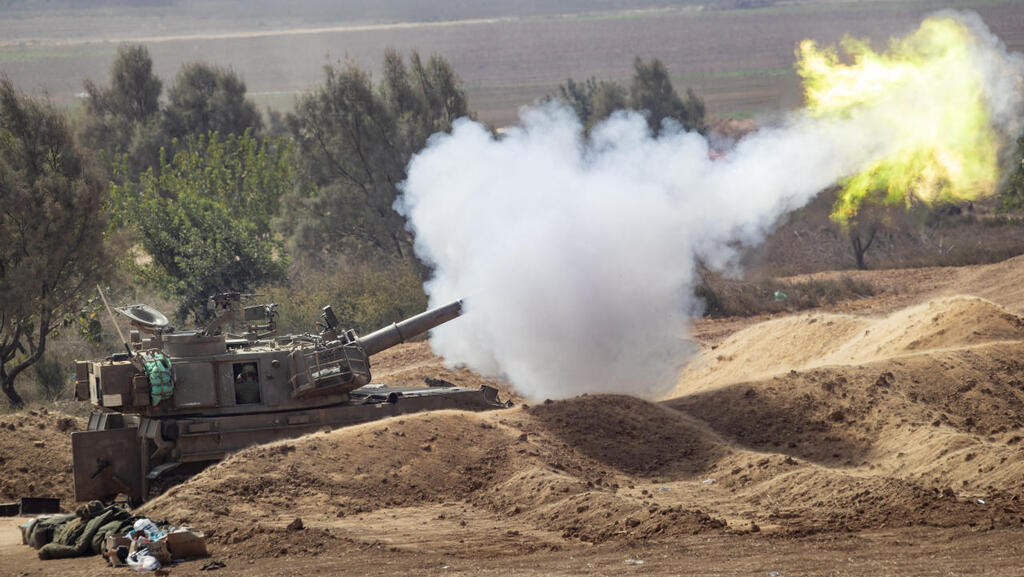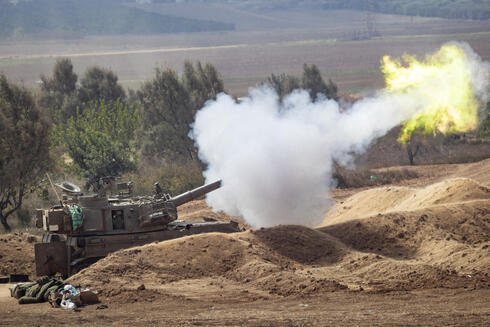
Global ammo shortage forcing Israel to limit Gaza bombings
The IDF is grappling with depleted ammunition stockpiles, having to navigate the delicate balance between addressing current missions and ensuring readiness for unforeseen challenges
"We have a huge deficit of ammunition not just in Ukraine but all over the world. We understand we should produce this here in Ukraine because all around the world it’s finished, it’s depleted. All the warehouses are empty," said Ukrainian Prime Minister Denys Shmyhal to the "Financial Times" in October of last year, addressing the ammunition situation of the Ukrainian army, which is interconnected with the challenges faced by the IDF.
The increased ammunition usage in the wars in Gaza and Ukraine has led to an unprecedented global shortage of ammunition of all types. While the IDF tries not to address the issue publicly, Major General Eliezer Toledano admitted last month that the IDF is reducing air attacks, emphasizing the necessity to "manage the economy of armaments" because the war will last a long time. Prime Minister Benjamin Netanyahu also commented on the matter, stating that "we need three things from the U.S.: armaments, armaments, armaments." At a press conference two weeks ago, Netanyahu announced that Israel is preparing the Israeli defense industries to "cut off dependence on the world," a goal that is not realistic in any way.
Even if the defense establishment rarely talks about the issue, they are dealing with it intensively: last week the Director General of the Ministry of Defense Eyal Zamir concluded a huge deal with the American government for the supply of aerial ammunition in the hundreds of millions of dollars, and so far over 25,000 tons of weapons have been sent to Israel since the beginning of the war in about 280 aircraft and about 40 ships. The Israeli defense industry is also tasked with filling the IDF's stocks. About two weeks ago it was published in Calcalist that the Israeli companies postponed the supply of weapons worth more than $1.5 billion to their customers across the world to divert resources for the IDF's combat needs and that in the last three months, the Ministry of Defense ordered more than NIS 10 billion ($2.7 million) worth of weapons from them. It should be noted that the shortage does not stem from a lack of budget but from a lack of supply, and the Treasury does not restrict the IDF from purchasing ammunition of any kind.
The tremendous need for armaments stems from the unusual amount of bombings that the IDF has carried out in Gaza since the outbreak of the war. Two weeks ago, the army announced that 30,000 targets had been attacked in Gaza. A security source told Calcalist that the rate of fire the IDF is using in the current war is similar to that of a "superpower," is comparable only to the capabilities demonstrated by the U.S., and probably also exceeds the number of armaments of the Russians in the campaign against Ukraine. In the foreign media, the subject is widely covered. It is claimed that the campaign in Gaza is one of the heaviest in history and it has been compared to the scope of the bombings of Germany in World War II.
Related articles:
There are several reasons for the significant increase in targets bombed in the war: the first is the improved technological ability. The ability to attack hundreds of targets a day stems from the technological developments in regards to carrying out attacks using precision weaponry that the IDF itself has only developed in the last decade and a half. When you have such capabilities, it is hard not to use them after the October 7th massacre. Another reason is that in the current war, the IDF adopted a policy of a lighter finger on the trigger regarding damage to infrastructure and Hamas operatives who are in a civilian environment, thus increasing the ability to hit targets that were not previously attacked. In addition to these reasons, there is also the added pressure from the political level, as well as from the public, who demand an increase in air force bombing to prevent as much as possible a risk to the forces on the ground.
A reminder of this was provided last week after the tragic incident in which 21 fighters were killed—an incident that immediately sparked a stormy discussion about the need to use ground forces for tasks of leveling buildings. At the same time, the IDF insists that any ground force that requires air support receives it. Despite the high capabilities of the Air Force, there are still many tasks that are better suited to the execution of infantrymen or combat engineering forces than the Air Force.
Even if all the reasons for the increased use of bombings are justified, one should ask whether, considering the existing ammunition stockpile, this policy may not harm the IDF's readiness to carry out future missions, especially given the existing security challenges and the probable scenario in which the IDF will be forced to carry out an attack in southern Lebanon as well. The IDF may be forced to better clarify its limitations to the politicians to avoid reaching an extreme scenario of an ammunition shortage, or in the words of General Toledano: "There is no infinite army."
